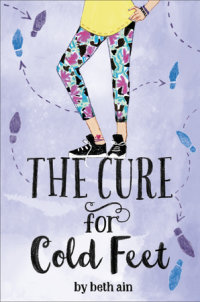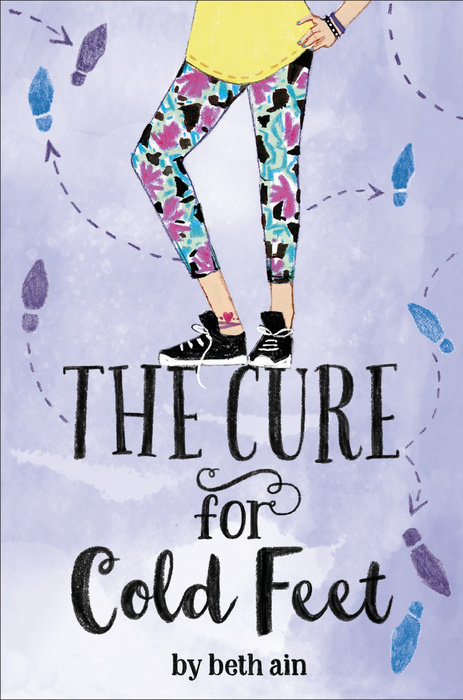The Cure for Cold Feet
Junior high school girls, meet your new BFF! Izzy Kline faces all the drama of middle school with total honesty and deep heart.
Hiding out in the girls' bathroom . . .
FaceTiming one friend while group chatting two others . . .
Forced to ballroom dance with a boy for a social studies unit . . .
There is a LOT going on in middle school.
New experiences and shifting dynamics are around every turn. And it's not just her friends--Izzy's family is shifting as well. It's anxiety-inducing but also thrilling as Izzy learns to stake her claim.
For fans of Fish in a Tree and verse novels like Brown Girl Dreaming, Beth Ain's books perfectly capture the drama of adolescence with a ton of light humor and deep heart.
An Excerpt fromThe Cure for Cold Feet
Middle of Nowhere
They say middle school is
THE WORST.
Everyone says this.
Literally.
(Everyone also says literally.)
Mom’s new best friend stopped by to say this thing just tonight.
The night before the first day of
middle school.
Are you excited? she asks,
all lit up,
in the middle of dinner.
Are you ready? she asks five minutes later,
in the middle of my sentence about
NOT BEING READY.
Did you pick out a new outfit? she asks,
sweetly,
in the
middle of dessert.
I roll my eyes.
A new attitude? she asks, looking at me out of the sides of her eyes.
Mom’s new best friend is a yogi,
a person who teaches yoga and wears yoga bracelets,
and leggings, and leg warmers that go all the way up to the
middle of her thighs.
Middle things everywhere.
Mom’s new best friend is Jasmine Allen,
also known as
Jackson Allen’s mom.
JACKSON ALLEN,
who is one of FOUR ANNOYING BOYS
who made their way through all of elementary school as an ANNOYING gang of finger-slamming people who made fun of any other person
who got
in the
middle of it
somehow.
Jackson is super excited, she says.
He’s at his dad’s tonight, but super, super excited.
I wish I were at MY dad’s tonight, I think
in the
middle of her third super.
Middle school is not
THE WORST, I think.
She is.
Drama
Quinn Mitchell is mostly worried about not knowing anyone all over again.
But you know ME, I insist,
thinking I am more than enough.
Dad always says I am A LOT.
And you know Lilly, I say,
putting my arm around good old Lilly’s neck.
Lilly, who has two ll’s where there should be one, like the flower. Lilly, whose second l turned out to be the least of her quirks.
And you can open your locker, Lilly says,
doing her part now.
Think about me! I scream,
half kidding.
Think about your poor friend Izzy, who is--
I fake a sob--
lock challenged.
I fall in a heap on the floor of her room.
My part.
I have become an actress in the last year,
says my mom,
who made sure I got extra singing and acting lessons after I sang and acted in
Free to Be . . . You and Me
in fourth grade,
a part given to me at the last minute by good old Lilly
and only because she got sick that day.
Quinn and Lilly and I became the best of friends that year, a little late in the game--
partly because Fiona and Sara had taken up all my friendship until then,
when they
left me behind
in part for soccer and dance and
in part for
too many other things to count.
Lilly turned Quinn and me from a twosome into a threesome late that fourth-grade year.
Partly I felt guilty for stealing Lilly’s song, and
partly I did not,
because I see now we were meant to be.
Three people who didn’t fit anywhere
in particular but together.
A friendship,
in three parts.
Long Division
The lunchroom is loud and there are long tables everywhere, waiting to be filled up with long groups of sixth graders
and their lunch trays,
their water bottles
spilling out of
insulated lunch bags.
But there are only two of us standing here,
insulating each other.
We won’t take up more than two-twelfths of a long table.
One-third of us is in another lunch period.
One-third of us is Lilly, with two l’s and only one of everything else,
who has to fend for herself, and it is hard enough to do this in twos.
I see a long table filled with
girls I have seen before,
girls who look more alike than not alike,
girls who have flashy smiles and bounce around each other before settling
evenly
into their spots, where they
divide
and conquer.
I picture them with a
bracket around them.
12 into 12
is 1,
no remainders.
We don’t fit.
We are divisors without a
dividend.
We will stay 2 at least until recess,
leaving space enough between our table and their table to remain
intact,
one whole number,
prime for whatever comes--
division,
addition,
multiplication,
or subtraction.
Markers
Senora Navalon speaks with feeling,
even when she writes
¡La clase de la Senora Navalon!
in dry-erase marker on the first day of Spanish class.
She bangs the marker so hard against the board that it
shakes a little,
rattling the other markers
in their holder.
Rattling me awake too.
Spanish, I find, is the opposite of Hebrew,
which is the only other language I have ever tried
to learn,
and which doesn’t even try to resemble English.
Hebrew looks to me, early on a Sunday morning,
at some uncivilized time,
when I can barely speak any language
at all,
more like the hieroglyphics I learned about last period,
in social studies.
Social studies. Where we will study
civilizations
this year,
where we will learn to be civilized ourselves,
through ballroom dance,
of all things,
marking the first time social studies will actually be
social.
But Spanish looks like English--
only better,
more civilized,
with beautiful little arty swirls and marks that do you the favor of
accenting the important part of a word,
making it seem festive,
fun,
to say
¡Buenos dias!
when Good morning always sounds very grumpy and
very sleepy
to me
when I wander into the kitchen,
when I
stare
into my cereal,
wishing for accents and art
and sleep.
Pioneers
I was the leader of my wagon train in fifth grade,
braving the elements with my supplies, my team,
my good sense.
It was an imagination assignment, a game we played
laughing loud--
hardy har har--
when some
imaginary person cut his
imaginary hand off with an imaginary ax,
because it was so horrifying
and fake and we were in fifth grade and most everything is funny
in fifth grade.
But this!
Sixth grade is a real expedition.
My wagon train is a bus I ride with James,
a bus, when I have only ever had my two feet to carry me,
because I used to be a walker,
just a couple stretches of sidewalk between my house
and Salem Ridge Elementary.
I could practically
stretch out
my arms from my street
and touch it.
Could count on my one and only classroom teacher,
when now I can count on nothing
except not knowing where I’m going
or which teacher--one for each subject--
will be mean,
will be nice,
will be something else new.
Can’t count on seeing my Salem Ridge friends either.
Just maybe catching a glimpse of them in the hallway or in gym class, some of them in my actual classes--
annoying Jackson in social studies,
Fiona of first-friend fame
in Spanish,
Quinn at lunch,
Lilly (with two l’s) in absolutely nothing with me,
out there roaming these
wide and lonesome halls
on her own.
Lonesome is the word.
At the end of a long day where I hardly speak,
except to ask Mr. Kaye for the math sheet because
he skipped me by accident.
I realize he did not see me, because
I am invisible.
Sixth graders are invisible,
heading out each day,
our provisions strapped onto our backs,
heavy with books and snacks,
three-ring binders.
The elements torturing us--
the breath of thirteen-year-olds
pushing back against us,
the spraying spit of an eighth grader ricocheting off the floor
and onto my arm.
I tread lightly
in these hallways,
I may be no leader here,
where the earth is sticky with sports drink,
but I have instincts still--
I feel a pit in my stomach,
in knots from a hard-to-digest lunch period,
that we may not all survive intact.
We are invisible and exposed
all at once.

